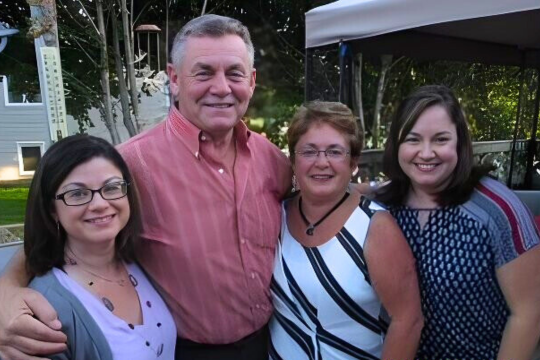
Brian Hills, a member of Federal Retirees’ Charlottetown Branch, became his wife’s primary caregiver in 2017. They are pictured here with their daughters, Paula Graham and Lisa Harvey.
When his wife got a much-needed bed in palliative care, a perceptive nurse told Brian Hills he could concentrate on being a husband again, instead of a caregiver.
Brian Hills lost his wife of 46 years in just four months — the hardest four months of his life. He and his beloved Sam had just returned from Cuba when she got the diagnosis — her third bout of breast cancer, and this one had metastasized.
“It was stage four — it had spread to her liver, brain, throughout her bones,” Brian says.
When Sam was diagnosed on March 14, 2017, Brian became her primary caregiver. She was already in pain. The two had just both just retired — he as a lieutenant in the navy and she as a dental assistant. Their plans for retirement travel came to an abrupt end when they sought help for Sam’s hip pain and received the chilling diagnosis.
Brian was determined to keep his wife at home as long as possible, but it was challenging.
“I looked after her for four months before we got the palliative care bed,” Hills says.
When they got the bed, one of the nurses told him he could then go back to being a husband, instead of a caregiver. It was a relief to know that someone else recognized that.
What haunted Brian through those difficult months was the lack of access to resources when he needed them. In the daytime, he would be able to call nurses for advice or in-person help, but after 10 p.m., when things invariably got worse for Sam, he was on his own.
“I just struggled with the whole thing,” he says. “There was no one to call. One night I had to call an ambulance.”
His life was consumed by “chasing Sam’s pain” and trying to relieve her of it.
“It was terrible,” he says, adding that it took two years to recover from the experience, though the grief continues. “I was in the navy for 35 years and I’ve seen some pretty bad things, but this… After a while just wears you down because you're so frustrated that you have this beautiful lady you've loved for 46 years who is in pain. At one point, her legs were so swollen, she was bleeding from her pores.”
“Sam knew I was doing my best and never complained, but I always felt I should be doing better.”
Brian says his two daughters — one in Summerside, P.E.I., and the other in Ottawa, Ont. — helped as much as possible and worried about their father, too. But they didn’t live in the same place, and they have families of their own.
“I do remember when one would relieve me and I could sleep for four or five hours, that was just amazing,” he says.
Brian says when the family got a palliative care bed for Sam, they were so grateful they felt as though they’d won the lottery. He subsequently spent many nights sleeping next to Sam in palliative care. While there, he realized those nurses might be able to support caregivers who were still at home with their loved ones.
“I wondered why couldn't I call palliative care nurse on station when I had questions in the night,” he says of those times when Sam was still at home. “It seemed like a resource that wasn’t being used to its full potential. There were some nights they were really busy, but other nights, everyone was sleeping.”
At a recent advocacy meeting, Brian asked the director of P.E.I. health about his idea and she acknowledged it was a good one. He will continue to pursue it. In the meantime, his advice for anyone caring for a loved one? “Don’t do this alone. If someone offers help, accept it with gratitude and take time for yourself.”

